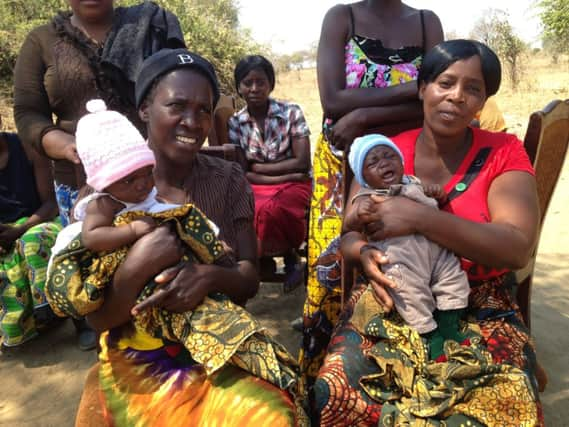Zambia: How Concern is helping to educate families about nutrition


One in two children in Zambia are classed as being stunted - that’s a stark statistic and one which Concern Worldwide has been trying to address for the past three years.
If early indications are anything to go by, the charity’s RAIN project which was established in the Mumbwa district, central Zambia, in 2011 has been a great success.
Advertisement
Hide AdAdvertisement
Hide AdThere is hope that the once evaluations are carried out when the project comes to an end next year, that it could be used a model project to be rolled out to other areas in Zambia - and even further afield.


Even the District Commissioner for Mumbwa district is full of praise for Concern’s work.
He admitted that local people needed re-educating about nutrition.
Praising Concern’s RAIN project, he commented: “I look forward to the day when the project is finished because that means the people have been re-educated about nutrition.”
Advertisement
Hide AdAdvertisement
Hide AdQuite simply RAIN - Realigning Agriculture to Improve Nutrition - aims to prevent child and maternal malnutrition among poor rural communties.


Working with Zambia’s health and agriculture ministries, the project has been primarily set up to tackle chronic under-nutrition as well as looking at how agriculture and gender equality can help address nutritional needs.
Speaking to Danielle Harvey, Concern Country Director for Zambia, it’s clear that if you can improve nutrition from an early age, it can make all the difference in a child’s development.
“If we can make those changes before a child reaches two, it can make all the difference,” Danielle said.
Advertisement
Hide AdAdvertisement
Hide AdShe added: “If you can produce food rich in nutrients, and eat that food all year round, it can improve the nutrition of both mother and child.”
The project aims to educate local women on growing nutritious food, something they wouldn’t normally have a say over as this has been primarily the man’s decision.
Rural farmers are more likely to grow maize and cotton because they pay more.
Through the RAIN project’s education programme, it is hoped that husbands will see the benefit to their family by allowing some of their land to be used to grow nutritious crops.
Advertisement
Hide AdAdvertisement
Hide AdRAIN is supporting families to diversify the food they grow in their homesteads and to rear small livestock such as goats and chickens.
While most men were initially sceptical of the concept, there are some who have came round to the idea and are now reaping the rewards.
So far there are 180 small model farms or homestead gardens in the Mumbwa district, with 4,500 people benefitting from the scheme.
The men I spoke to in Muchena and Lungo villages were seeing great benefits for their family, both nutritional and monetary.
Advertisement
Hide AdAdvertisement
Hide AdShadreck Hanga’ndo and his wife Mainess Munamalambo, from Muchena village, established their homestead garden three months ago.
Going from growing maize and cotton, the family homestead is flourishing with a variety of crops including spinach, tomato, onions, sweet potato, okra.
Shadreck told me: “I really enjoy working in the garden with Mainess; the whole family is involved.
“We are growing 11 crops now and there is real variety for what we eat.”
Advertisement
Hide AdAdvertisement
Hide AdIn Lungo, Brighton Mweemba and his wife Catherine have just as bountiful a homestead garden.
Brighton admits that he had his doubts initially but can now see the benefits to his family.
“The family now has different food; we are eating different food everyday,” Brighton said.
Local women are also seeing the benefits of a more varied and nutritious diet.
Advertisement
Hide AdAdvertisement
Hide AdIn Lungo, Filula Shakauma gave birth to twins two months early. Now three months and thriving, Filula says Jacobi and Bette are proof that nutritious food can make all the difference.
Filula said: “Because of the work of Concern, thanks to produce and nutrients, we now have the energy to produce twins and the energy to then look after them.”